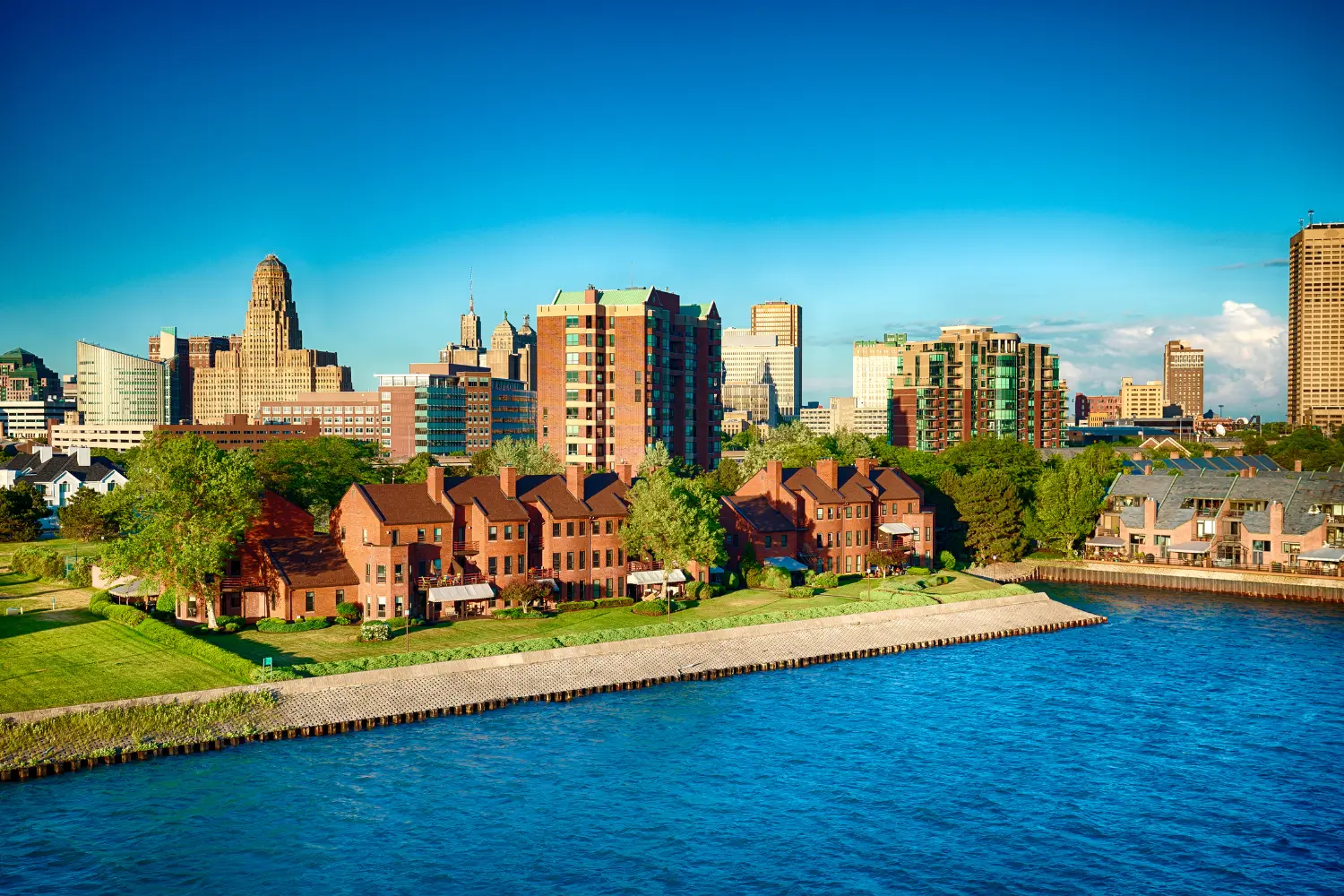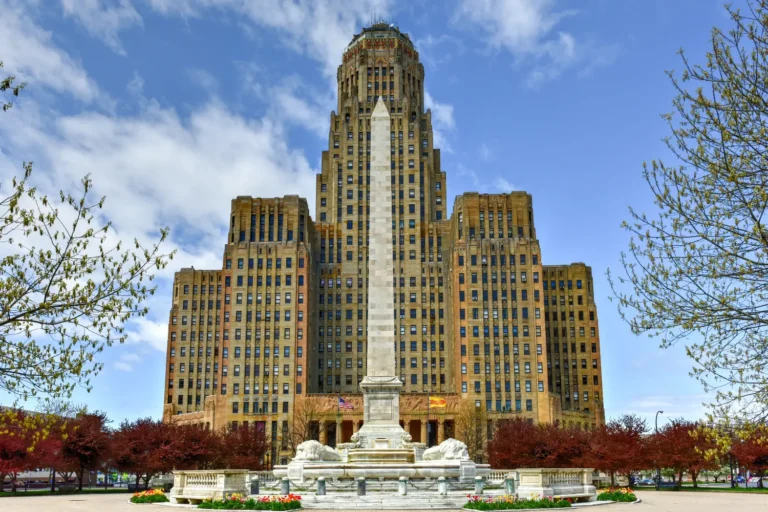
Buffalo Drug Rehab | Addiction Treatment Resources
Local Resources & Information to Start Your Recovery Journey
If you are in the Buffalo area and need help now, call (631) 849-8686
Help Is Available for Those Struggling With Addiction in Buffalo

Buffalo is a city in New York and the county seat of Erie County. Located along the eastern end of Lake Erie at the head of the Niagara River, Buffalo is home to remarkable art, music, architecture, history, and sports.
Despite all the city has to offer, Buffalo residents struggle with drugs and alcohol like much of the country. Fortunately, drug rehab in Buffalo offers help and hope for overcoming addiction. Learn more about the available addiction treatment resources in Buffalo, NY.
Types of Addiction Treatment in Buffalo
Whether you need detox in Buffalo or a full range of addiction treatments, there are a range of options to help with recovery. Here are some services you can expect from a recovery center:
Quitting the use of a substance can come with intense withdrawal symptoms. Detoxing under the supervision of a medical team can help you stay as safe and comfortable as possible during this crucial period.
Detox is an important first step in addiction treatment, but it’s not enough on its own. Residential treatment or inpatient treatment offers 24/7 support and care to address the psychological aspects of addiction.
Addiction is common among healthcare workers because of the high stress of their field. A healthcare professionals program created by healthcare workers for healthcare workers can be beneficial in addressing your unique needs and challenges.
Addiction recovery is an ongoing process. Continuing care ensures that you have the appropriate level of care throughout the journey, including mental and behavioral health sessions and other resources.
Medication-assisted treatment (MAT) provides targeted medication therapy that can help with intense cravings and lingering withdrawal symptoms, allowing you to focus on your recovery.
Alumni care is a vital part of your transition to everyday life after addiction treatment. These programs typically offer accountability exercises, coping skills, stress management training, and more.
How to Choose the Right Drug Rehab Center for Your Loved One in Buffalo
The addiction treatment facility you choose plays an important role in your recovery. Here are some considerations to find the best fit for you:
Accreditation and licensing ensure that the rehab center is committed to providing the highest standards of care according to independent governing bodies.
There are different approaches to addiction treatment, including evidence-based care and wellness-based treatments. Consider what types of therapies may be best for you.
The levels of care meet you at each stage of recovery. Evaluate the levels of care available at each rehab center to ensure they have what you need for your entire recovery experience, such as aftercare or outpatient treatment.
Choose a rehab center with experienced staff trained in addiction treatment to ensure you’re getting the best possible care.
If you have a co-occurring disorder like mental health issues alongside your substance abuse, dual diagnosis treatment is essential to address both conditions simultaneously.
There are advantages and disadvantages to staying close to home for rehab. You have a closer connection to friends and family for support, but you may benefit from getting a little distance from the people, places, and things associated with your substance use.
If you have health insurance coverage for substance use disorder treatment, it’s best to choose a rehab center that’s in network with your provider. If you have to pay out of pocket, look for rehab centers that offer alternative payment arrangements to help with the costs of treatment services.
Continuing Recovery Care & Sober Living Programs in Buffalo
The shift from addiction treatment to everyday life can be jarring. Often, this is a vulnerable time for relapse as people experience the everyday stressors of life. Aftercare programs in Buffalo can help with this period by building skills for coping, managing stress, preparing for triggers, and preventing relapse.
For some, the best option after drug and alcohol rehab is a sober living home. These communal living environments foster accountability with set curfews, mandatory recovery meetings, a substance-free environment, and house chores. There are many options for sober homes in Buffalo, including premium options with high accountability expectations.
Contact Admissions TodayEmergency Services for Addiction in Buffalo
There are always risks with addiction, including mental health crises and overdoses. It’s important to know where you can turn in an emergency. Fortunately, Buffalo has many top-rated hospitals to provide short-term care and stabilization during a mental health crisis.
Mercy Hospital of Buffalo (24/7)
565 Abbott Rd
Buffalo, NY 14220
(716) 826-7000
Buffalo General Medical Center (24/7)
100 High St.
Buffalo, NY 14203
(716) 859-5600
Millard Fillmore Suburban Hospital (24/7)
1540 Maple Rd
Williamsville, NY 14221
(716) 568-3600
ECMC Health Campus (24/7)
462 Grider St.
Buffalo, NY 14215
(716) 898-3000
Community Resources for Mental Health & Addiction
NAMI Buffalo & Erie County
Local branch of the National Alliance of Mental Health for mental health support and referrals for county residents.
Visit site24-Hour Addiction Hotline Buffalo and Erie County
Addiction support for county residents at 716-831-7007
Call now
24-Hour Crisis Hotline for Buffalo and Erie County
Mental health support for Buffalo and Erie County at 716-834-3131
Call now
988 Suicide and Crisis Lifeline
Alcoholics Anonymous
SMART Recovery
Refuge Recovery
Narcotics Anonymous
Narcan Classes and Overdose Prevention Training

Local Stats You Need to Know
Like New York State, Erie County has been in the grips of the opioid crisis for several years. Compared to the rest of the state, Erie County has a higher opioid death rate from overdoses at 24.6 per 100,000 people.[1] The county also had a higher rate of emergency department visits related to opioid use at 69.2 per 100,000 people.[2]
Fentanyl and other drugs continue to play a growing role in deaths in Erie County, with the number of fatal drug overdoses climbing to 122 in 2022.[3] In 2023, there were 245 cases of confirmed and probable opioid-related deaths.[4] Drugs were also a contributory factor in six of the county’s 58 suicides that same year.[5]

Sober Activities in Buffalo
If you want to spend time in Buffalo without drugs and alcohol, there’s plenty to see and do. Here’s some inspiration for how to spend your time:
- Tour Frank Lloyd Wright’s Martin House.
- Learn about local history at the Buffalo and Erie County Naval & Military Park.
- See masterpieces of artwork at the Buffalo AKG Art Museum.
- Visit the Theodore Roosevelt Inaugural National Historic Site.
- Attend an event on the schedule at Canalside.
- See vintage automobiles at the Pierce-Arrow Museum.
- Relax and unwind at the Buffalo and Erie County Botanical Gardens.
How to Pay for Addiction Treatment in Buffalo

If you’re making the decision to enter addiction treatment, you shouldn’t have to worry about how you’ll pay for it. Many insurance companies offer coverage for addiction treatment, at least in part, but it can vary by your provider, plan, and the specific treatment center.
Insurance companies often have in-network providers that offer low-cost services to plan members in exchange for referrals. This means you’ll likely have lower expenses for your treatment. You can still choose a rehab center that’s out of network, but you may be responsible for higher out-of-pocket costs.
Frequently Asked Questions About Attending Rehab in Buffalo
Will My Treatment Be Confidential?
Yes, addiction treatment is completely private. It’s covered by the same laws that ensure any healthcare is private, so you don’t have to be concerned about the information you share during your therapy sessions.
How Long Does Drug Rehab Last?
Drug rehab is usually an average of 30 to 45 days, but it can change based on your treatment plan and progress. With detox, residential rehabilitation, and aftercare, your program could last a few months.
How Do I Know If I Need Rehab?
The decision to pursue addiction treatment is highly personal. However, some people may seek treatment because they feel that their substance use has gotten out of their control or it’s having a negative impact on their work, health, or personal relationships.
Start Your Recovery in Buffalo
Take the first step in overcoming addiction.